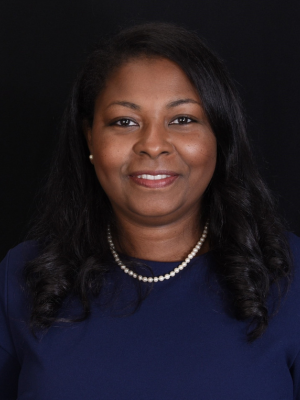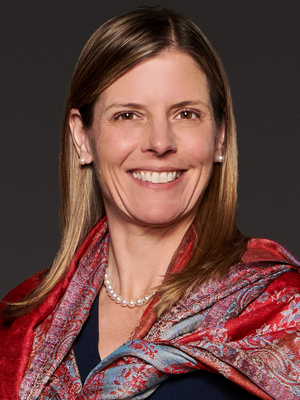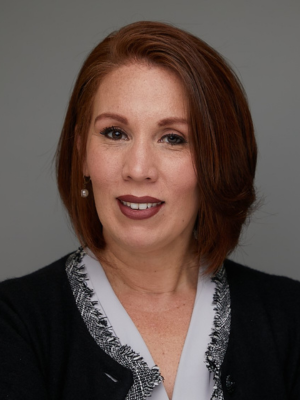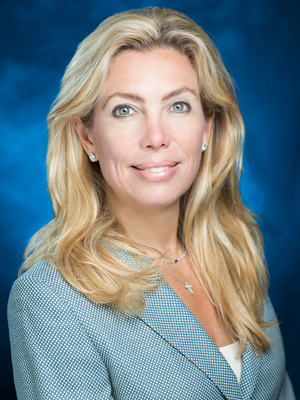 “It’s about making connections at a deeper level and not just transactional or at the business level. We really are on this journey together,” says Tiara Henderson. “So many of our new and existing clients are excited to know that there is a group that is solely focused on engaging and retaining diverse-led and diverse-owned firms while delivering the entire spectrum of Wells Fargo products and services.”
“It’s about making connections at a deeper level and not just transactional or at the business level. We really are on this journey together,” says Tiara Henderson. “So many of our new and existing clients are excited to know that there is a group that is solely focused on engaging and retaining diverse-led and diverse-owned firms while delivering the entire spectrum of Wells Fargo products and services.”
Diversifying The Advantage of Financing
As a psychology major at Davidson College, Henderson recalls, “What we learned in liberal arts was to think critically and the rest will fall in place. That skill is of paramount importance in every job or career, no matter the industry.”
During her senior year, Henderson interned for a developer, her doorway into commercial real estate and development, which led to her early career path, which included working for affordable property development (Hope VI) to mixed-income property development to Commercial Mortgage-Backed Securities (CMBS). She joined Wells Fargo ten years ago, originally in the Commercial Mortgage Loan and Securities Finance group which provides credit facilities to non-bank commercial real estate lenders.
Advancing to her current role in August 2021, Henderson wears many hats as both Head of Women’s Segment for Corporate & Investment Banking (CIB) and Head of Diverse Segments for Commercial Real Estate (CRE). Her two roles have one mission: identifying, engaging and retaining more diverse bank clients.
“What drew me to this role was the opportunity to create something new while having an impact on women and other diverse owned and led firms. It’s the chance for me to bring them to the table and watch their platforms grow as we surround them with support, resources, and access, and not just access to capital, but access to information, people and ideas.”
She iterates that it’s not only her passion, but a Wells Fargo priority.
“Having the support of the leadership at Wells Fargo in the work that we do has been tremendous – necessary, but also tremendous,” says Henderson. “There is a positive spotlight on our group at all times and when people speak of Diverse Segments as an ‘initiative,’ senior leaders will quickly step in and say, ‘no, this is part of the fabric.’”
Building Relationships with Diverse Owners
Henderson spends her days finding and engaging with new clients, deepening relationships with existing clients and re-engaging previous clients – including outreach through panels, conferences and events. Her group, (led by Danielle Squires – Head of Diverse Segments, CIB) is set up to foster close collaboration with her banking and markets diverse segments partners to meet the multi-functional needs of a given customer. She says her people-oriented personality is core: really listening to what clients are looking for and what their needs are and making the right introductions for them.
“Because of our differentiated approach to client management, we are able to engage and have an immediate connection with clients,” she says.
Henderson’s team creates events that bring in a wide array of clients from smaller and larger diverse-owned firms. While she loves to golf, for example, some of her clients might not be drawn to such a traditional networking event. So, when her team put on the Women’s Leadership Summer last October, they tailored it to their audience.
“It’s hard to get people out of the office for three days to travel, especially when we’re talking about CEOs and women in the C-Suite,” she said. “We were hoping to get 50 or 60 people, but we had 90 women enrolled, because this was an event created and curated for women, and it resonated.”
She adds the biggest feedback she received from the women’s leadership conference was it should be longer and no suits or heels – only yoga clothes allowed. Wells Fargo is no stranger to hosting events that celebrate diversity. For example, Wells Fargo sponsors the Spoleto Festival, and last spring, her clients (some with their families) traveled to Charleston for Memorial Day weekend and the world premiere of the opera, “Omar” – based on the autobiography, translated from Arabic, of West African Muslim scholar, Omar ibn Said, who was enslaved in the Carolinas, after being captured at the age of 37. The opera was composed by Grammy-winning artist, Rhiannon Giddens.
“These events reach our clients on a deeper level and it’s why they are so successful,” says Henderson. “We are connecting in a more meaningful way, and they appreciate and enjoy engaging with Wells Fargo.”
If You See Her, You Can Be Her
Henderson can be trusted to bring candor, connection, and industry knowledge to the table. Being regularly in the room with top senior leaders to witness firsthand how strategies and ideas can be pulled apart has leveled up her own strategic thinking – for example how to engage with women or build up the CRE diverse segments platform.
“Keeping that leadership lens and the lens of ‘who is my audience’ at all times is a skill that I’ve had to sharpen and will continue to hone as we evolve our strategic priorities and throughout the implementation of our strategic plan,” she says.
As a woman of color in the banking industry, Henderson comments, “I’m competitive and I like a good challenge. If someone says ‘it can’t be done,’ well that is probably the best motivator for me.”
Recently, she wrote an internal piece: “If you can see her, you can be her” – highlighting the importance of having diverse leaders who blaze the trail since it encourages others to envision themselves as future leaders too. She notes that it has traditionally been harder to find diverse representation in banking, and cites seeing more diverse representation on the Wells Fargo CIB operating committee (eg. Kara McShane, head of CRE, the largest real estate platform in the country and her own boss, Danielle Squires), as a sign of measurable change.
“That motivates different people to envision a career in banking, because now they see the path to leadership,” says Henderson. “That can change the mosaic of our future leadership.”
But she admits she’s catching up to seeing herself as that person who others will aspire to be: “Many women in leadership roles still don’t give themselves enough credit that we are, indeed, leaders. We feel like we never get ‘there’,” she observes. “The first time someone reached out to ask for time on my calendar, I had to take a step back and realize I have gone through this 25+ year career path and people are interested in connecting with me as a leader. But I also know it’s a two-way street. There is always something we can learn from each other, no matter what your level is within an organization.”
A Personal Board of Directors and Ownership
Through experience, Henderson has observed the leadership traits she seeks to emulate, as well as those she doesn’t. She prefers the calm, confident, strategic thinker as a leadership approach, which she identifies with. One suggestion she received from a mentor was to have a personal board of directors, people who you trust and can consult for advice.
“I want the disruptor. Somebody who is always thinking of the antithesis and they’re not going to give you the answer you want to hear. They’re going to shoot it to you straight and play devil’s advocate. I also want the people who have lots of lived experience and are highly competent, who can provide the guidance that helps you stay grounded in the decisions that you make,” she says. “Also, for me, having a spiritual person is important because that helps you stay centered. Depending on what I’m contemplating, I may also need someone industry specific. Your personal board can help shape goals and strategies.”
Henderson advises her mentees to be their own best advocate and take control of their career, because no one else is going to do that for them. In her view, this has become more important versus 20 years ago in Corporate America, when people-focused middle managers would meet to talk about career paths. Now, she notes, managers tend to be product-specific experts over a product group, but that doesn’t always mean they are experts at managing people.
“I think, because of that, the onus is now on each individual employee to think through their career, their path and trajectory and bring that to their manager, whereas in the past it was more of a team effort,” she observes. “I have had some great managers who I would absolutely invite to my board of directors.”
Networking – Whether It Comes Naturally Or Not
“Networking comes naturally to some people and for others, it doesn’t. The first step is to understand which bucket you’re in,” she advises. “If you are a natural networker, find as many chances as you can to put that to use because it’s only going to be to your benefit. If you are not a good networker, you need to recognize that, number one, and focus on growing that skill.”
She points out various ways to do this for those it doesn’t come naturally to. Perhaps its networking with people in your industry, where you have more confidence. Then, perhaps expand to network with people in banking, covering different industries. But find your niche and focus on growing the skill from there.
Henderson considers herself somewhere in the middle. But she’s learned networking hacks: “If there’s an event that evening, I try to reserve some energy so that I am prepared and charged for the networking that will come into play.”
She also knows that she must be mentally prepared if the networking involves working her way around a room of 500+ people, but she’s noticed an exception to that rule: “What I’ve found is that if I speak on a panel or I’m introduced as a sponsor, I am very comfortable tearing through the room and meeting everyone afterwards,” she notes. “I can take it from there!”
A Personal Board of Supporters
One hard truth that Henderson has learned to accept is that not everyone has a vested interest in your success: “Some people are not going to be a cheerleader,” she says. But focus on the bright spots. Along with a board of directors, you also need a board of supporters and hopefully they are one in the same. Once you have shaped your strategy and goals, you need those people who are going to continue to support you and push you forward.”
As a wife and mother of a 14-year-old daughter and 11-year-old son, she’s very focused on her children’s school activities and sports. Her daughter is a “retired” competitive gymnast turned tennis player, while her son excels in any sport that ends in the word “ball” and lacrosse. He’s following in his dad’s footsteps. His dad is in the Davidson College Football Hall of Fame and, interestingly enough, also has had a long career in commercial real estate. Henderson loves going to the beach, playing golf, and sharing moments with friends and family.









